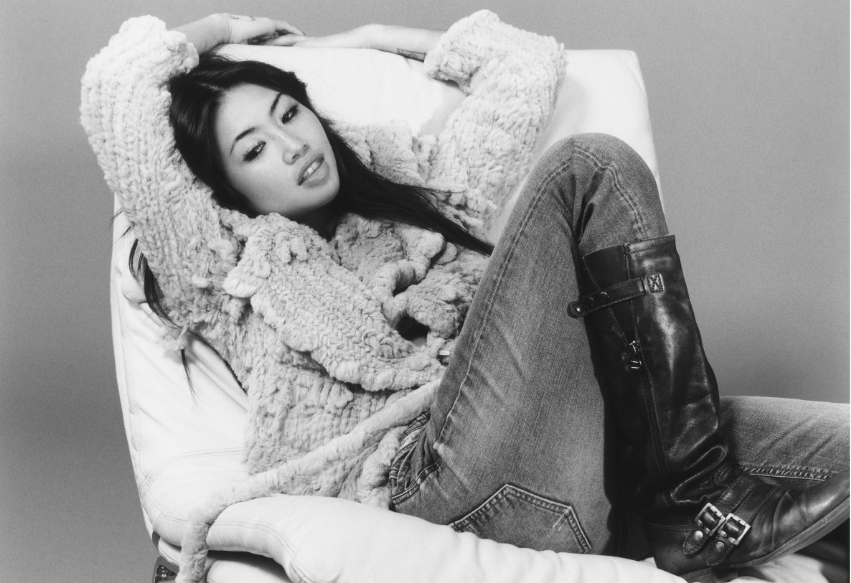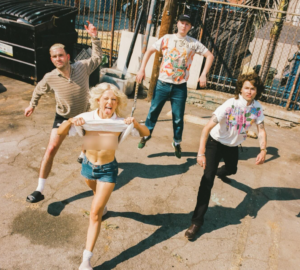This Is How Tomorrow Moves: Beabadoobee Album Review

Image Credit: Jules Moskovtchenko
Written by Karishma Phandey, edited by Millie Cain.
Following her sophomore album Beatopia, the Grunge-Pop Princess softens into her third album with a dazed sense of maturity and zealous yet bewildered lyrics – all accompanied by an undercurrent of folk, jazz, and country influences.
Swapping her bedroom recording style for recording Rick Rubin at his Shangri-La studio in Malibu, this 14-track album is a maturation of her previous work, whereby the rose-tinted fantasy of Beatopia is overturned by her new-found acceptance of crimson reality. And so begrudgingly, she battles all of which encompasses her human experience on This is How Tomorrow Moves – out on her label Dirty Hit on 9th August.
Rubin’s work with acclaimed artists spanning from Hip-Hop’s Public Enemy to Country’s Johnny Cash is starkly heard throughout the project. From styles of punk, ska, jazz, indie, and pop – Rubin lays a jaunty yet confrontational foundation reclaimed by Bea’s bubblegum indie vocals. Yet, her blunter lyricism and fluidity with genres solidifies her as an artist in such we bear witness to Bea swapping her DIY-indie-Doc Martens for worldly-polished-kitten heels.
On This is How Tomorrow Moves, Beabadoobee is dealing with bittersweet womanhood by sonically exploring herself through the lens of mid-20s-journaling, moving away from the angsty teen-diary-keeping. We can find Bea grounding herself through descriptions of self-awareness, vanity, emotional turmoil, and maturity. She says, “I love this album – I feel like it’s helped me so much more than anything else has in navigating this new era, this new understanding of where I’m at. I guess it’s about becoming a woman.’ Despite the dissonance of her thoughts and reality, we are very much dealing with Bea reclaiming her perceptions of herself.
The album opens with heavy indie-rock-influenced tracks including her lead single, Take A Bite. An introduction into Bea’s growing pains, she spirals into self-sabotage because her love-lorn conscious “wanting a taste” is overridden by a craving for sanity. This is both sonically and thematically followed with California, a spring-break rock tune, cased in her indie roots, depicting her romantic accountability.
As the troubles and turmoil of love continue, the influences take an eccentric turn with sorrowful and apathetic ex-lore (the punchy One Time) and her unsatisfying one-night-stands voiced by her restlessness (the whimsical of Real Man).
However, Bea’s insecurities extend beyond the romantic – with the country-folk fuelled Tie My Shoes, the vocally-charged ballad Girl Song, and bluesy Coming Home – as she veers into a cripplingly vulnerable state of self-analysis. The previously unruffled singer is forced to look inward, reconnect with childlike meekness, and consider her connection between familial wounds and feelings of worthlessness as a self-saboteur. Notably, her contemporaries are accompanied by another girlhood anthem as Billie’s poignant What Was I Made For, Charli’s vibrant Girl, So Confusing and Clairo’s rustic Sexy to Somebody is joined by Girl Song.
The pacing of This Is How Tomorrow Moves revivifies as her tone elates. Another single, Ever Seen, captures a contemplative optimism adorned with a thumping drum beat and country strings. Considering it was inspired during Bea’s time touring with Taylor Swift and her upcoming Glastonbury performance, this hold-your-friends-close-to-you anthem is sure to match festival seasons. Then ensues (my personal highlight of the album) A Cruel Affair – a vivacious bossa nova, ska union detailing her bittersweet adoration of another woman – and indie-pop tunes Post and Beaches.
Bea finalises her project, weaving her vulnerabilities with conviction into a tapestry of acceptance. Everything I Want, similar to Real Man, is a jilted declaration of self-affirmation with a honky-tonk production. This is followed by The Man Who Left Too Soon, a cinematic piece examining bereavement and grief, which is a solemn reminder of the universal experience of observing life. She finishes off with the whimsical lullaby This Is How It Went, where she softly begs for both escapism and boundaries.
Following her previous album, Beabadoobee continues her struggle into aimless adulthood however with a tone of acceptance. It is a poignant elaboration on growing up as a tolerance of fate with a lingering child-like neediness. Though not dropping the aspects of her bubblegum grunge, her and Rubin’s direction and variety were playful in moments like Ever Seen’s punchy drumbeat and One Time’s Matilda-esque chanting. It is not a dramatic shift, which is unfortunate, but the project’s cohesiveness is commendable.
This Is How Tomorrow Moves is available on all streaming platforms tomorrow, and is on tour this November, including shows at Leeds 02 Academy (17th November) and Manchester 02 Victoria Warehouse (16th November).





